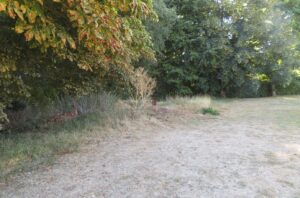Support us from £3/month
We deal with almost 1000 cases a year assisting communities, groups and individuals in protecting their local spaces and paths in all parts of England and Wales. Can you help us by joining as a member?
We have welcomed a decision to preserve part of Preston recreation ground, in Hertfordshire, which the parish council wanted to convert to a private garden.
Preston Parish Council wanted to sell off around 70 square metres of Preston recreation ground, which lies on the west side of Hitchin Road, in the village west of Stevenage. The land would have been sold to incorporate into a neighbouring householder’s garden.
This particular area was an ancient remnant of unenclosed roadside verges, which it is understood had been acquired by the parish council in 1946[1] . The wastes were registered by the parish council under the Commons Registration Act 1965 as a village green (VG4). In order to dispose of the land free of any constraints, the parish council had to apply to the Secretary of State for Environment, Food and Rural Affairs to deregister the land under section 16 of the Commons Act 2006.
The society objected to the application, pointing out that it was the secretary of state’s policy published in 2015 to grant such an application, where no other land was offered in substitution, only in exceptional circumstances.
The inspector appointed by the secretary of state, Helen O’Connor LLB MA MRTPI, agreed. In her decision of 12 October 2022, she refused consent, finding: ‘The case in support of deregistering the land … is considerably weakened by the absence of any suitable replacement land. I find the justification put forward insufficient to amount to the exceptional circumstances generally required by the 2015 Guidance.’

The part of Preston village green threatened with conversion to a garden
One of our case officers, Hugh Craddock, said: ‘This is one of several recent decisions in which inspectors have made clear that the secretary of state’s policy means what it says: even small areas of town or village green should not be deregistered without an offer of replacement land, unless there are truly exceptional circumstances. It would save everyone time and expense if applicants accepted that it is the policy, and offered worthwhile replacement land from the off. Until they do, we shall continue to oppose applications which are more about private than public benefit.’
Hugh added: ‘the parish council had so neglected this part of the recreation ground that it has become unsightly and hard to use, presumably in order to bolster its case for disposal. It’s no wonder that the neighbouring householder wanted to buy it off the council. The answer is not to flog it off, but to restore it to public enjoyment as a corner for quiet contemplation.’
[1] It is understood that the parish council acquired the wastes and commons of the Manor and Lordship of Temple Dinsley, including the application land, by a conveyance dated 3 June 1946 from the personal representatives of the late Barrington White.
